Courses Paid courses Supporting Wellbeing and Mental Health in Schools
Supporting Wellbeing and Mental Health in Schools
| Achieve a certificate |

It’s now estimated that 3 children in every classroom have a diagnosable mental health disorder or issue. If a child or young person has an emotional need, it can significantly impact their academic achievements, levels of progress and social interactions with their peers and adults. Early intervention and support are critical if these learners are to feel well-informed and able to talk about and manage their emotional disorder, anxiety or concerns.
Recognising that an anxious or angry pupil will not learn, this course aims to provide educators with the tools and language to help a learner thrive. You will learn about national guidance and the governments push towards mental health and wellbeing provision in schools. You will also learn how to foster a whole school ethos to mental health and explore practical tools and strategies to improve the outcomes for children who need mental health support.
This course responds to the information needs of the whole community centred around supporting the child/young person with mental health needs. You will learn how to assess the needs of a learner with mental health needs and go on to develop a support plan consisting of SMART goals and interventions, which you will implement and later review to determine how well it has met the learner’s specific developmental needs.
The target age range is compulsory education (4-18 years), but the course may benefit those in early years settings too. Parents and carers benefit from raised awareness of their child’s needs. Advisory teachers, therapists and educational psychologists gain access to evidence-based CPD resources that can be used to strengthen capacity in their local authority and schools. Schools can use this course to train individuals or groups of teachers and teaching support staff as part of a school’s improvement plan or a whole-school initiative. NQTs/RQTs also build a secure knowledge of the graduated approach at the start of their career.
We recommend you also watch our SEND Practice Webinar on Supporting Wellbeing and Mental Health in Schools
Course learning outcomes
On successful completion of the course, you will be able to:
- identify the main types of mental health disorder and their potential impact on pupil outcomes
- explain the relationship between mental health and disability
- summarise the place of social and emotional learning in the curriculum
- present the significance of staff mental health and wellbeing
- describe specific approaches and tools that schools can adopt to monitor and support pupil wellbeing
- determine when to seek further information and support from a variety of sources
- develop a conceptual framework for supporting mental health in schools where pupils and teachers can thrive
- create and test your own ‘whole school approach’ action plan
Our courses are structured into six sections. Click on the section headings to reveal page titles and some example content.
Explore the concepts of wellbeing and mental health, the main influences on these, and the impact on pupil outcomes.
- Section objectives
- Introduction
- The Personal, Social, Health and Economic (PSHE) curriculum
- What do we mean by mental health and wellbeing?
- Influences on mental health and wellbeing
-
Influence of social media
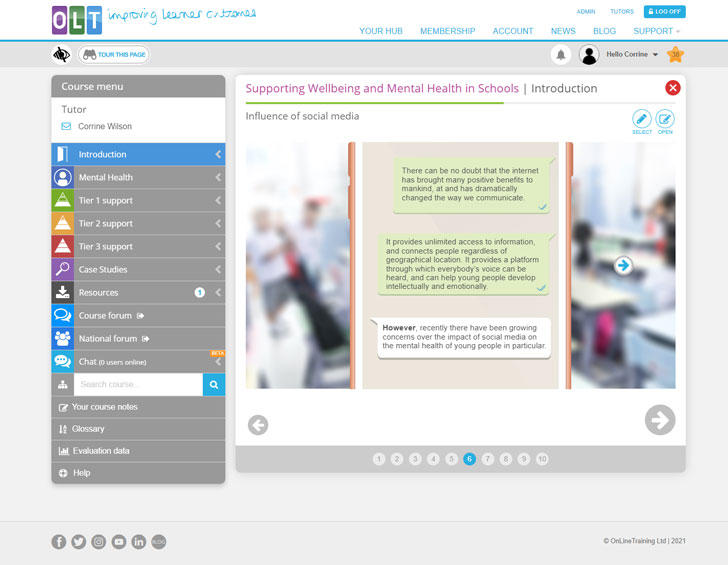
Screenshot from Introduction page 6 - Mental health and wellbeing and academic outcomes
- Models of mental health and wellbeing
- The incidence of mental health difficulties in the UK
- Section summary
Learn about the main types of mental health disorder and their incidence, and the relationship between mental health and disability.
- Section objectives
- Introduction
- Specific disorders
- Other disorders which may be encountered in schools
-
Trauma and mental health
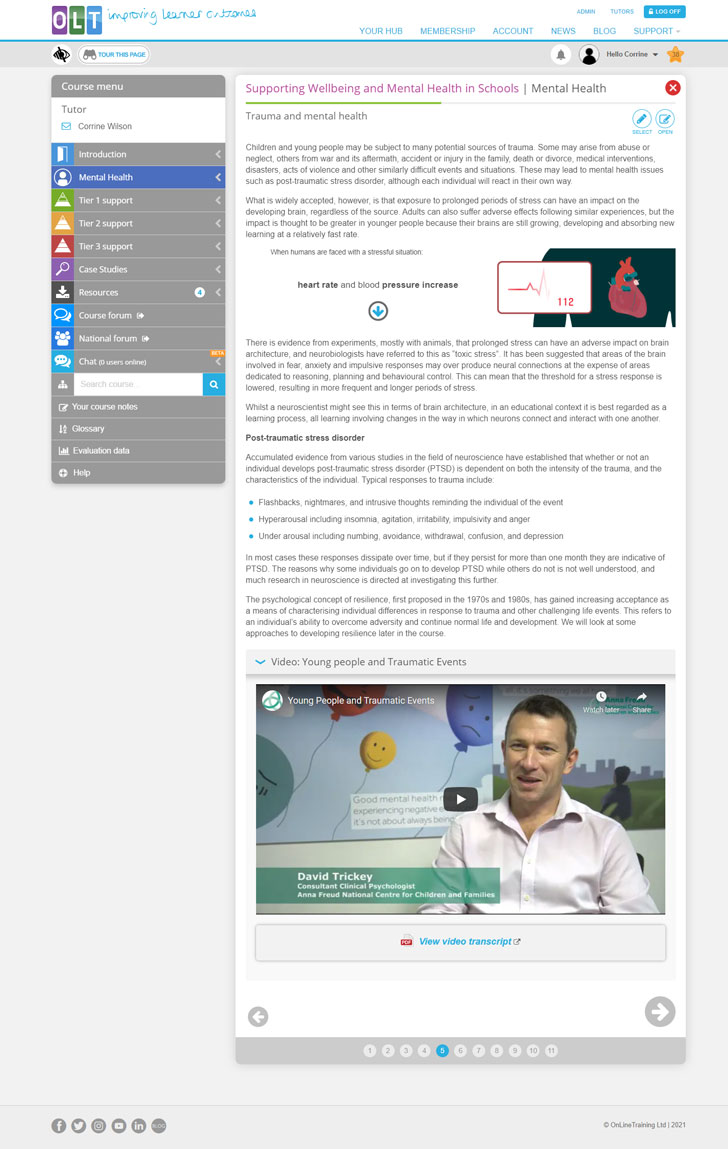
Screenshot from Mental Health page 5 - Self-harm
- Suicide
- The mental health of pupils with a disability
- Staff mental health and wellbeing
- End of section quiz
- Section summary
Explore a range of approaches to assess and support wellbeing and mental health in your school.
- Section objectives
-
A framework for supporting mental health and wellbeing in schools
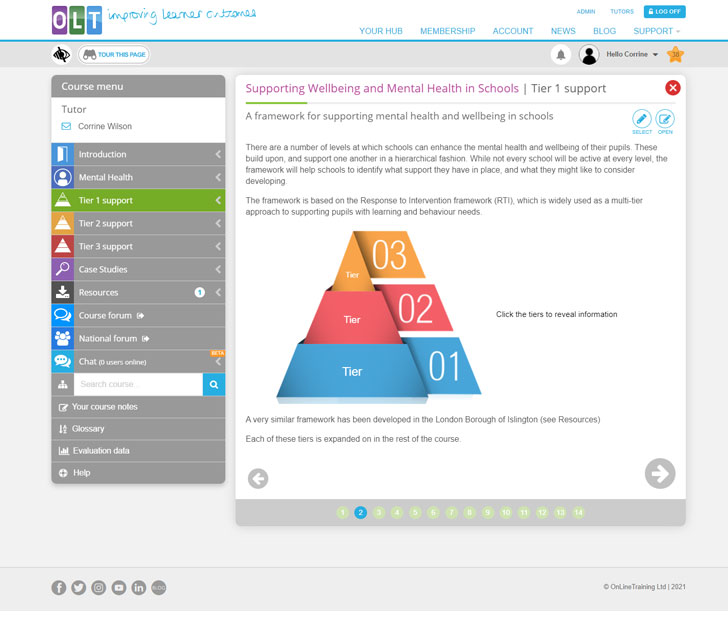
Screenshot from Tier 1 support page 2 - Whole school ethos
- Social and emotional learning (SEL)
- Assessing social and emotional learning
- Some whole school approaches
- Growth mindset
- Strengths-based approaches
- Positive psychology
- Resilience
- Mindfulness
- Trauma informed practice
- Course assignment: Your SMART goal and actions (Tier 1)
- Section summary
Consider the possible uses of wellbeing surveys and questionnaires in schools and learn the guidelines for administering them and evaluating the results.
- Section objectives
-
Being aware
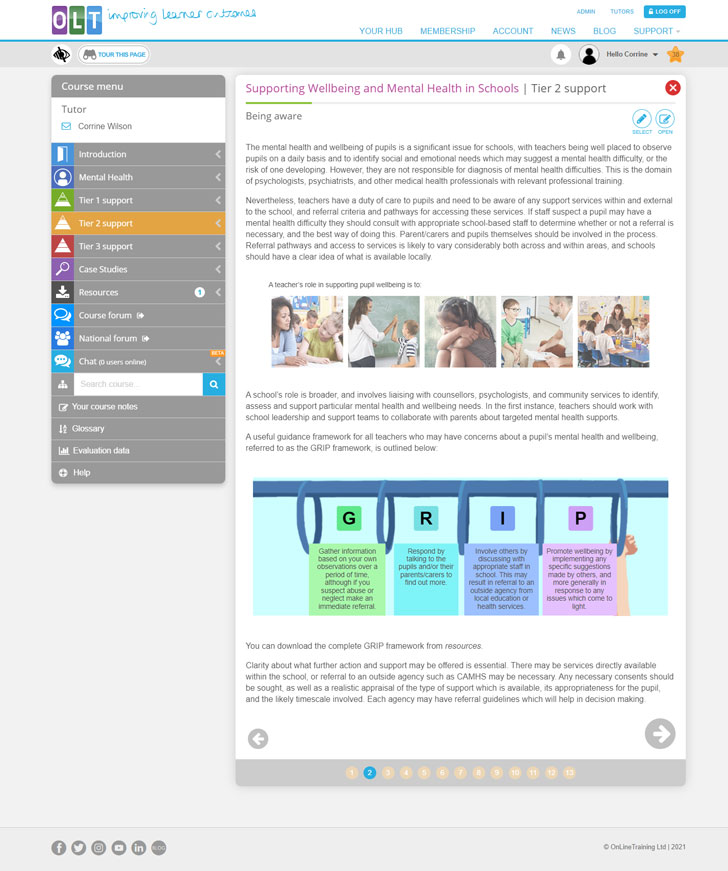
Screenshot from Tier 2 support page 2 - Wellbeing surveys and questionnaires
- Assessment: gain a picture of wellbeing in a particular cohort
- Identifying individuals with mental health issues
- Assessment: identify individuals with mental health issues
- Evaluating the effectiveness of any strategies or interventions
- Assessment: evaluate the effectiveness of strategies or interventions
- Some freely available assessment resources
- Not for profit organisations providing support
- Course assignment: Your SMART goal and actions (Tier 2)
- End of section quiz
- Section summary
Understand the main elements of a supportive school ethos and know when and where to seek further support.
- Section objectives
- Local services
-
The team around the child
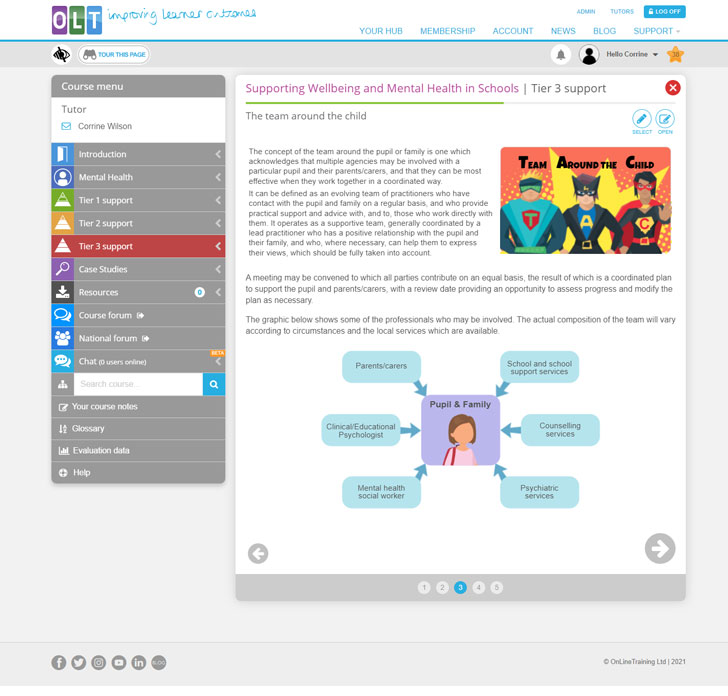
Screenshot from Tier 3 support page 3 - Course assignment: Your SMART goal and actions (Tier 3)
- Section summary
View videos of authentic learners and observe the impact of interventions to help address social, emotional and psychological issues.
- Case study: Mental health - in our own words
- Case study: Tier 3 Interventions and support
- Case study: Using a worry scale
It has given me additional resources and considerations as to how we respond to mental health in the academy. I feel more confident that our approach is on the right lines and know how to escalate concerns that we might have. It has also allowed me to explore how we can become more proactive in our response.
Senior Leader (07/06/2021)
It has made me much more aware of wellbeing and mental health and specific challenges as well as the impact of different conditions and situations. I feel much more confident in supporting children within our school as well as developing CPD for the staff for us all to move forward in this crucial area. It has been very thought provoking for myself as a teacher but also as a parent and it has had a positive impact on my classroom practice. I am also more confident to plan and implement interventions and know that it is useful to have all the information on this course to refer back to. I have really enjoyed this course. Thank you for your support.
Teaching Assistant (12/04/2021)
A very timely course after the current lock-down. Supporting Social/emotional mental health & well-being of children in Primary is one of my strengths and reading from up to date & relevant sources was very helpful. Forum questions & statements enabled space to think through issues, rather than just reading through resources. Setting goals shaped my classroom practice, embedding knowledge into practice
Teaching Assistant (24/03/2021)
To be able to support colleagues and children in my school. Use different strategies for experiences. Be able to understand work life balance
Teaching Assistant (11/03/2021)
This training has, for me, cemented the fact that mental health and wellbeing can be nurtured and cared for in school settings. If children feel safe, valued and supported within their educational setting, then hopefully they will grow into young adults who feel like they have purpose and value in our world.
Teaching Assistant (08/02/2021)
This course has reinforced my strong belief that good mental health & well-being is key to everybody in society. When we have the tools to be able to help & support both others and ourselves, we can be equipped to look at strategies to offer support and guidance in times of need.
Teaching Assistant (12/01/2021)
The training gave me the information and time to explore and develop my own knowledge whilst also thinking about the school I work in. It gave me time to reflect on school policy and procedures as well as my own role and development. The information was clear and user friendly. I think the target sections were very useful in making sure the knowledge I have gained will have an impact on the school and my own development. I have led some training for support staff and we have also looked at the resources we are currently in school. We have also spoken more about mental health between staff and these conversations seem to happen more freely.
Teaching Assistant (13/11/2020)
| Rating |
| |
Delivery
|
| |
20 hours, 1-2 hrs per week |
| |
Flexible start date |
| |
Assignment
|
Licences
Your school or education system can purchase a licence to deliver our courses.
Contact us to find out moreCertification
20 hrs CPD Certified What's this?
Certificate of Achievement

